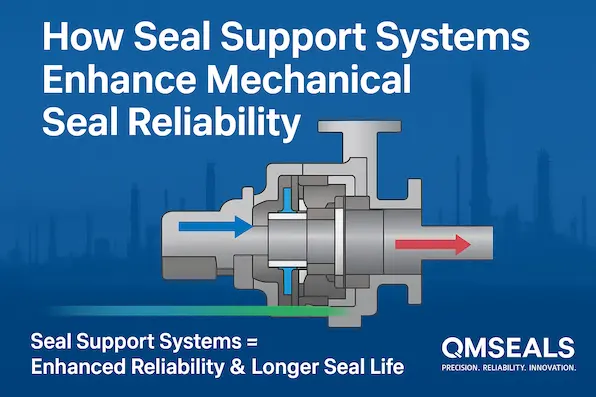Posted At: Sep 23, 2025 - 581 Views

How Seal Support Systems Enhance Mechanical Seal Reliability
In modern pumping applications, mechanical seals play a critical role in preventing leakage and ensuring equipment runs smoothly. However, the performance and reliability of mechanical seals are not solely dependent on their design or material selection. They are also significantly influenced by the seal support systems that work alongside them.
Whether you’re operating pumps in oil and gas, petrochemicals, power generation, or chemical processing, understanding the importance of seal support systems can help you maximize uptime, reduce maintenance costs, and extend the life of your seals.
What Are Seal Support Systems?
Seal support systems are auxiliary arrangements designed to control the environment around a mechanical seal. They provide flushing, cooling, lubrication, or pressure control—depending on the seal’s type and operating conditions. These systems are typically standardized by API 682, which defines different plans (such as Plan 11, Plan 52, Plan 53A, etc.) for various sealing applications.
Simply put, seal support systems create the right conditions for a seal to operate reliably by:
Preventing excessive heat buildup
Controlling leakage paths
Protecting against contamination
Stabilizing pressure around the seal
Why Seal Support Systems Are Essential
Without proper support, even the most advanced mechanical seal can fail prematurely. Here’s how seal support systems enhance reliability:
1. Improved Cooling
Friction between rotating and stationary faces generates heat. If not controlled, this heat can cause seal face damage, thermal distortion, or even catastrophic failure. Cooling plans (such as Plan 21 or Plan 23) circulate a flush or coolant around the seal, maintaining stable operating temperatures.
2. Effective Lubrication
A thin film of fluid is necessary to lubricate seal faces. Support systems supply this fluid in the correct quantity and quality. For example, a Plan 32 injects clean fluid into the seal chamber to maintain proper lubrication and prevent wear.
3. Contamination Control
Many industrial processes involve dirty, abrasive, or crystallizing fluids that can damage seals. Support systems, like Plan 62 (steam quench) or Plan 32 (clean flush), keep harmful particles away from the seal faces, reducing the risk of clogging and extending service life.
4. Leakage Management
Double mechanical seals rely on barrier or buffer fluids provided by support systems (Plans 52, 53A/B/C). These fluids not only enhance cooling but also prevent hazardous or toxic process fluids from leaking into the atmosphere—ensuring safety and compliance.
5. Pressure Stabilization
Some processes require the seal chamber pressure to be carefully controlled. Pressurized barrier systems help maintain the correct differential pressure across seal faces, which minimizes leakage and improves reliability under challenging operating conditions.
Types of Seal Support Systems
Seal support systems vary depending on process requirements and the type of seal. The most common include:
API Plan 11 – Circulates process fluid to the seal chamber for cooling.
API Plan 21/23 – Provides cooled process fluid to maintain seal temperature.
API Plan 32 – Injects clean external fluid to flush contaminants.
API Plan 52 – Buffer fluid system for unpressurized dual seals.
API Plan 53A/B/C – Pressurized barrier fluid systems for double seals.
API Plan 62 – External quench (steam, water, or nitrogen) to prevent crystallization or icing.
Selecting the right plan depends on the process fluid, operating pressure, temperature, and safety requirements.
Benefits of Using Seal Support Systems
Implementing the right seal support system provides several long-term advantages:
Extended Seal Life – Reduced wear and thermal damage.
Lower Maintenance Costs – Fewer seal replacements and repairs.
Improved Safety – Controlled leakage of hazardous fluids.
Higher Equipment Availability – Reduced downtime from seal failures.
Energy Efficiency – Optimized lubrication and cooling reduce power losses.
Choosing the Right Seal Support System
When selecting a seal support system, engineers must consider:
Process fluid characteristics (temperature, abrasiveness, toxicity)
Seal type (single, double, or cartridge)
Industry standards (API 682 compliance)
Safety and environmental regulations
Partnering with a reliable mechanical seal supplier like QM Seals ensures that you get not only the best seal technology but also the right support system tailored to your application.
Conclusion
Mechanical seal reliability doesn’t depend on the seal alone—it’s also about the environment in which it operates. Seal support systems provide the necessary cooling, lubrication, contamination control, and pressure management that enable seals to perform at their best. By integrating the right support system with your mechanical seals, you can achieve safer operations, minimize downtime, and maximize the return on your pump investment.
At QM Seals, we specialize in providing high-performance mechanical seals and seal support solutions designed to meet the most demanding industrial challenges. Contact our team today to learn more about how we can enhance the reliability of your sealing systems.


